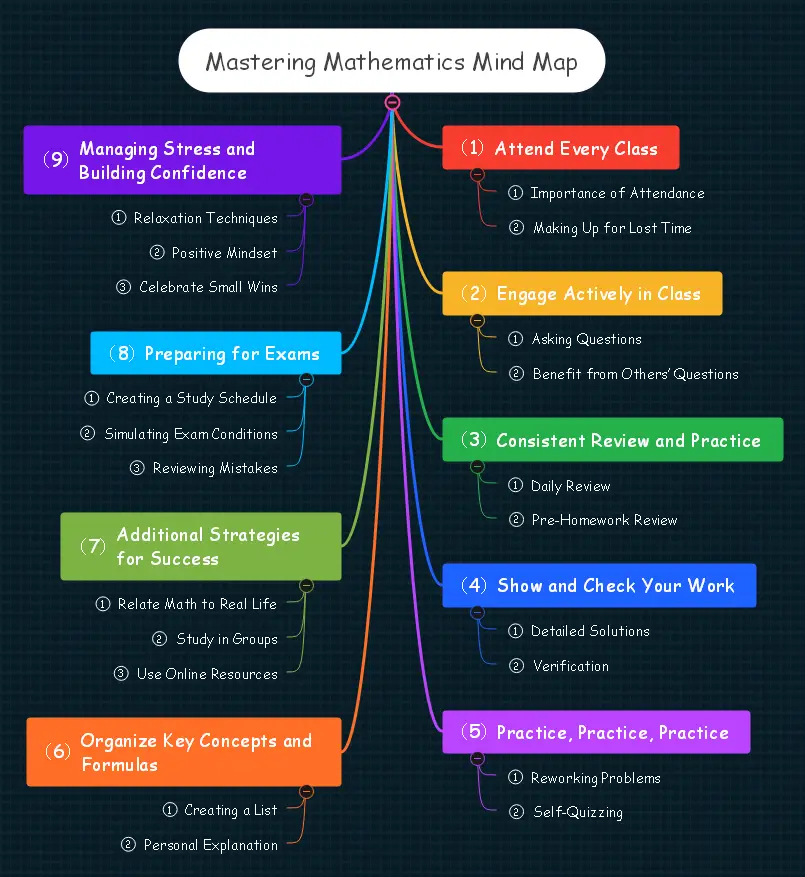Mathematics often feels daunting, but with the right approach, anyone can excel the subject. Studying math requires discipline, strategy, and consistent effort. Here’s a detailed guide to mastering your math studies, complemented by tried and tested strategies.
1. Attend Every Class
Importance of Attendance
- Attending class is crucial for grasping new concepts and building a solid foundation. Each lesson builds on the last, so consistency is key.
- Missing classes can leave gaps in understanding, leading to confusion and frustration.
Making Up for Lost Time
- If you miss a class, make use of resources like classmates’ notes or recorded lectures.
- Teachers are often willing to help; don’t hesitate to reach out for a summary or clarification of missed material.
2. Engage Actively in Class
Asking Questions
- Don’t shy away from asking questions, no matter how trivial they may seem. Clarification is the first step toward understanding.
- Examples:
- “Can you explain that step again?”
- “How does this formula apply to real-world scenarios?”
Benefit from Others’ Questions
- Often, classmates will ask questions that you hadn’t considered, shedding light on potential blind spots in your understanding.
- Listen actively and take notes when others ask for clarifications.
3. Consistent Review and Practice
Daily Review
- Spend 10-20 minutes daily to reinforce your understanding. This prevents overwhelming last-minute cramming.
Example Daily Schedule:
| Activity | Time |
|---|---|
| Review Class Notes | 10 minutes |
| Solve 3 Practice Problems | 10 minutes |
Pre-Homework Review
- Before starting homework, review relevant notes to refresh your memory.
- This makes it easier to apply what you’ve learned and complete assignments efficiently.
4. Show and Check Your Work
Detailed Solutions
- Always write down each step of your solution process. This helps trace errors and refine your understanding.
- Encourages logical thinking and provides a clear path to follow.
Verification
- Develop a habit of double-checking your work to catch errors early.
- Create a checklist:
- Are all calculations correct?
- Are the units consistent?
- Is the final answer reasonable?
5. Practice, Practice, Practice
Reworking Problems
- Revisiting homework problems without looking at solutions solidifies your understanding.
- Try to solve the same problem using different methods to find alternative solutions.
Self-Quizzing
- Cover answers and test yourself on key concepts to ensure readiness for exams.
- Utilize flashcards for formulas and important principles.
6. Organize Key Concepts and Formulas
Creating a List
- Compile a concise list of essential formulas and concepts for quick reference.
Example of Formula List:
| Concept | Formula |
|---|---|
| Quadratic Formula | \( x = \frac{-b \pm \sqrt{b^2 – 4ac}}{2a} \) |
| Pythagorean Theorem | \( a^2 + b^2 = c^2 \) |
Personal Explanation
- Explain concepts in your own words to ensure true understanding, not just memorization.
- Teaching someone else is a great way to test your understanding.
7. Additional Strategies for Success
Relate Math to Real Life
- Identify real-world applications of mathematical concepts to enhance interest and comprehension.
- Examples:
- Calculating interest rates in finance.
- Geometry principles in architecture and design.
Study in Groups
- Study groups offer diverse perspectives on problem-solving and help clarify doubts.
- Rotate group leaders to cover different topics for comprehensive learning.
Use Online Resources
- Platforms like Khan Academy or Coursera offer tutorials and interactive lessons.
- Practice with online quizzes to reinforce learning.
8. Preparing for Exams
Creating a Study Schedule
- Begin preparation well in advance with a structured study plan covering all topics.
Example Study Schedule:
| Day | Topic | Time Allocation |
|---|---|---|
| Monday | Algebra | 1 hour review + practice |
| Wednesday | Calculus | 1 hour review + practice |
Simulating Exam Conditions
- Practice solving previous papers in a timed setting to build exam endurance and improve time management.
Reviewing Mistakes
- Keep a log of errors from past tests and regularly review them to avoid repeating the same mistakes.
9. Managing Stress and Building Confidence
Relaxation Techniques
- Incorporate relaxation methods like deep breathing or meditation to manage stress.
- Short breaks during study sessions can enhance focus and retention.
Positive Mindset
- Cultivate a positive attitude towards math. A confident mindset enhances performance.
- Reward yourself after mastering a difficult concept or solving a challenging problem.
Celebrate Small Wins
- Acknowledge each achievement, no matter how minor. This boosts motivation and morale.
Mastering Mathematics Mind Map

Mastering mathematics relies not just on innate talent but on disciplined effort and smart strategies. By attending classes, engaging actively, practicing consistently, and using additional resources, anyone can improve their math skills. Remember, persistence, patience, and positivity are key. Embrace the journey of learning math with an open mind, and success will follow.
